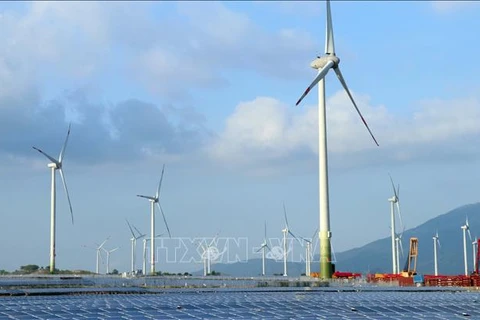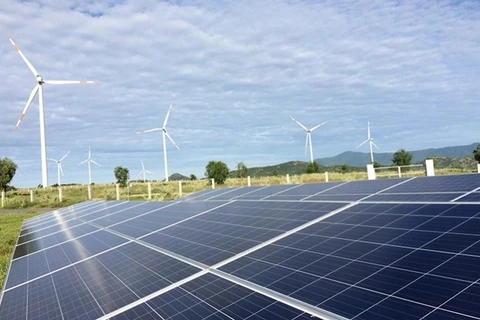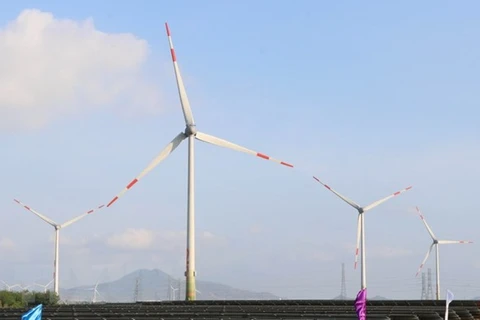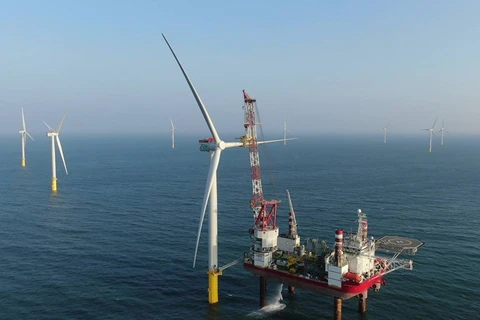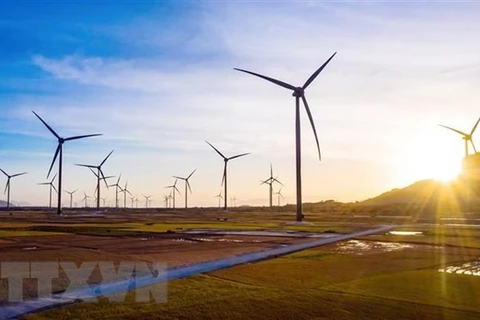Hanoi (VNS/VNA) - The Ministry of Industry and Trade has recently introduced new ceiling prices for solar and wind energy in Vietnam.
On October 3, 2022, the ministry released Circular 15, which sets out a framework for Vietnam Electricity (EVN) to enter into tariff negotiations with developers of transitional solar and wind energy projects by reference to some specific ceiling prices.
On January 7, 2023, the ministry set the ceiling prices at 1,184.90 VND (5.05 cents) per kWh for ground-mounted solar projects, 1,508.27 VND (6.43 cents) for floating solar projects, 1,587.12 VND (6.77 cents) for onshore wind projects, and 1,815.95 VND (7.75 cents) for offshore wind projects.
EVN will now use these ceiling prices to negotiate tariffs with transitional projects, which are not subject to any tariff so far.
At a seminar earlier this week, Deputy Chairman of the Vietnam Energy Association Nguyen Van Vy remarked that renewable energy in Vietnam was facing various obstacles.
Under Circular 32 on power purchase agreement, avoidable cost is defined as the highest cost of producing one kWh of electricity by national generating stations, and the cost would be avoided if EVN purchases the electricity from alternative small hydropower plants.
He revealed that the current avoidable cost was set at 1,100 VND (4.68 cents) per kWh, so low that it disincentivises investments in new hydropower plants. He thus called for an adjustment to the cost, estimating that a rate of between 3,500-4,000 VND per kWh would be more practical.
Regarding biomass power plants, he said that the plants are fueled by bagasse residue of sugar refining during the sugarcane season and other types of biomass during the rest of the year.
Under his estimation, the plants need to make at least 7.03 cents for each kWh generated by the bagasse and 8.47 cents for other types of biomass to break even. Unfortunately, their electricity is purchased at a price as high as the former, leading to the plants staying idle for eight months every year.
He called for a revision to Decision 08, which set the purchasing price of biomass-derived electricity at over 8.47 cents per kWh during the period out of sugarcane season to encourage the use of other types of biomass in electricity generation.
He was also concerned that the policy mechanism to support solar and wind energy had expired and a new mechanism had not been introduced, leading to a situation that newly built solar and wind farms were put on hold due to the absence of an official feed-in tariff (FIT).
He suggested a temporary FIT, in the meantime, to keep the farms operational until an official FIT would come into force under a new mechanism, which would be applied retroactively to the farms.
"An official FIT was absent when Binh Thuan Wind Power Plant No 1 began operation years ago. At that time, I suggested a temporary FIT of 6.00 cents per kWh and the Prime Minister approved my suggestion," said Vy./.
On October 3, 2022, the ministry released Circular 15, which sets out a framework for Vietnam Electricity (EVN) to enter into tariff negotiations with developers of transitional solar and wind energy projects by reference to some specific ceiling prices.
On January 7, 2023, the ministry set the ceiling prices at 1,184.90 VND (5.05 cents) per kWh for ground-mounted solar projects, 1,508.27 VND (6.43 cents) for floating solar projects, 1,587.12 VND (6.77 cents) for onshore wind projects, and 1,815.95 VND (7.75 cents) for offshore wind projects.
EVN will now use these ceiling prices to negotiate tariffs with transitional projects, which are not subject to any tariff so far.
At a seminar earlier this week, Deputy Chairman of the Vietnam Energy Association Nguyen Van Vy remarked that renewable energy in Vietnam was facing various obstacles.
Under Circular 32 on power purchase agreement, avoidable cost is defined as the highest cost of producing one kWh of electricity by national generating stations, and the cost would be avoided if EVN purchases the electricity from alternative small hydropower plants.
He revealed that the current avoidable cost was set at 1,100 VND (4.68 cents) per kWh, so low that it disincentivises investments in new hydropower plants. He thus called for an adjustment to the cost, estimating that a rate of between 3,500-4,000 VND per kWh would be more practical.
Regarding biomass power plants, he said that the plants are fueled by bagasse residue of sugar refining during the sugarcane season and other types of biomass during the rest of the year.
Under his estimation, the plants need to make at least 7.03 cents for each kWh generated by the bagasse and 8.47 cents for other types of biomass to break even. Unfortunately, their electricity is purchased at a price as high as the former, leading to the plants staying idle for eight months every year.
He called for a revision to Decision 08, which set the purchasing price of biomass-derived electricity at over 8.47 cents per kWh during the period out of sugarcane season to encourage the use of other types of biomass in electricity generation.
He was also concerned that the policy mechanism to support solar and wind energy had expired and a new mechanism had not been introduced, leading to a situation that newly built solar and wind farms were put on hold due to the absence of an official feed-in tariff (FIT).
He suggested a temporary FIT, in the meantime, to keep the farms operational until an official FIT would come into force under a new mechanism, which would be applied retroactively to the farms.
"An official FIT was absent when Binh Thuan Wind Power Plant No 1 began operation years ago. At that time, I suggested a temporary FIT of 6.00 cents per kWh and the Prime Minister approved my suggestion," said Vy./.
VNA

